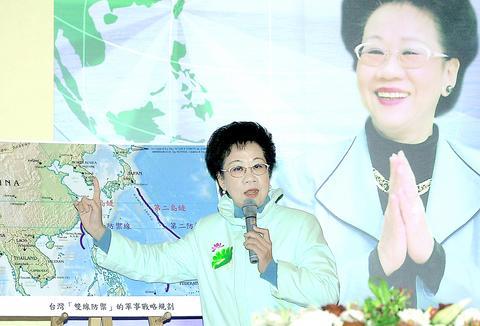Vice President Annette Lu (呂秀蓮) yesterday expressed her willingness to have a TV debate with her pan-blue counterpart, vice presidential candidate James Soong (宋楚瑜).
The ruling Democratic Progressive Party's (DPP) campaign headquarters will negotiate with the pan-blue camp today about the arrangements for holding TV debates between both camps' presidential candidates, President Chen Shui-bian (陳水扁) and the Chinese Nationalist Party's (KMT) chairman Lien Chan (連戰).

PHOTO: YEH CHIH-MING, TAIPEI TIMES
Lu yesterday urged the DPP headquarters to help her arrange a vice-presidential candidate TV debate.
"While the public is accusing both camps of running a negative campaign and urges all candidates to set a good example while campaigning, I must stress that I am the only one who continues to promote policies concerning the nation's future," Lu said yesterday during the launch of her new book, The Great Future of Taiwan.
"It seems that everyone just forgets about me and my efforts to establish a clean, esteemed and honorable campaign has been completely ignored by the media, which just want to grab sensational and dirty issues."
"So, I am expecting that the media now will facilitate the opportunity to allow I and Mr. Soong to expound our ideas and visions," she said.
Lu said that the Central Election Committee only arranged a TV speech for the two vice-presidential candidates on Feb. 28, which is the day she and all DPP members will join the Taiwan Solidarity Union's (TSU) "1 million hand-in-hand" effort.
"I hope that the committee will be understanding and postpone the TV speech to the next day," she said.
During yesterday's conference, Lu again advocated creating a Democratic Pacific Union and enhancing the development of an "ocean culture" by uniting the countries of the Asia-Pacific region.
She said that Taiwan's "soft power," which integrates Taiwan's outstanding achievements in technology, democracy, human rights and especially maintaining peace despite China's long-term military threats, are the best weapons to use against the Beijing authority's "Great China Empire" intentions.
Asking to comment on whether the international community's concern about President Chen's referendum plan will benefit the DPP's campaign or not, Lu said that the trend of internationalization of the "Taiwan issue" or the "cross-strait issue" will help maintain Taiwan's security.

A preclearance service to facilitate entry for people traveling to select airports in Japan would be available from Thursday next week to Feb. 25 at Taiwan Taoyuan International Airport, Taoyuan International Airport Corp (TIAC) said on Tuesday. The service was first made available to Taiwanese travelers throughout the winter vacation of 2024 and during the Lunar New Year holiday. In addition to flights to the Japanese cities of Hakodate, Asahikawa, Akita, Sendai, Niigata, Okayama, Takamatsu, Kumamoto and Kagoshima, the service would be available to travelers to Kobe and Oita. The service can be accessed by passengers of 15 flight routes operated by

GIVE AND TAKE: Blood demand continues to rise each year, while fewer young donors are available due to the nation’s falling birthrate, a doctor said Blood donors can redeem points earned from donations to obtain limited edition Formosan black bear travel mugs, the Kaohsiung Blood Center said yesterday, as it announced a goal of stocking 20,000 units of blood prior to the Lunar New Year. The last month of the lunar year is National Blood Donation Month, when local centers seek to stockpile blood for use during the Lunar New Year holiday. The blood demand in southern Taiwan — including Tainan and Kaohsiung, as well as Chiayi, Pingtung, Penghu and Taitung counties — is about 2,000 units per day, the center said. The donation campaign aims to boost

ENHANCING EFFICIENCY: The apron can accommodate 16 airplanes overnight at Taoyuan airport while work on the third runway continues, the transport minister said A new temporary overnight parking apron at Taiwan Taoyuan International Airport is to start operating on Friday next week to boost operational efficiency while the third runway is being constructed, the Ministry of Transportation and Communications said yesterday. The apron — one of the crucial projects in the construction of the third runway — can accommodate 16 aircraft overnight at the nation’s largest international airport, Minister of Transportation and Communications Chen Shih-kai (陳世凱) told reporters while inspecting the new facility yesterday morning. Aside from providing the airport operator with greater flexibility in aircraft parking during the third runway construction,

MORE FALL: An investigation into one of Xi’s key cronies, part of a broader ‘anti-corruption’ drive, indicates that he might have a deep distrust in the military, an expert said China’s latest military purge underscores systemic risks in its shift from collective leadership to sole rule under Chinese President Xi Jinping (習近平), and could disrupt its chain of command and military capabilities, a national security official said yesterday. If decisionmaking within the Chinese Communist Party has become “irrational” under one-man rule, the Taiwan Strait and the regional situation must be approached with extreme caution, given unforeseen risks, they added. The anonymous official made the remarks as China’s Central Military Commission Vice Chairman Zhang Youxia (張又俠) and Joint Staff Department Chief of Staff Liu Zhenli (劉振立) were reportedly being investigated for suspected “serious